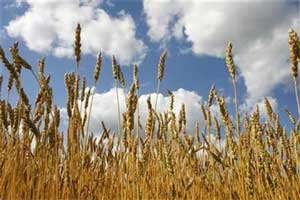With 17 of the 29 states in the country including large ones like Uttar Pradesh, Tamil Nadu, Gujarat and Andhra Pradesh yet to get ready for the roll-out of the National Food Security Act (NFSA) despite constant prodding, the Centre is finally cracking the whip, reports Sandip Das in New Delhi. According to a Cabinet note being circulated by the food ministry, states which fail to implement the NFSA by December-end would have to lift PDS grain at the minimum support prices (MSPs), far higher than the current rates.
The NFSA, launched by the UPA government in 2013 and which the Modi government has decided to retain, is meant to ensure supply of highly subsidised food grains to around 84 crore people in the country. The scheme was to be rolled out all over the country from July 2014, a year after the law was made, but has missed several deadlines.
For below poverty line families, the non-NFSA states get rice and wheat at Rs 5.6/kg and Rs 4.1/kg, respectively, from the Centre; the MSPs (paid to farmers) for these grains in the last season was Rs 18.75/kg and Rs 14.1/kg, rates which the states would find prohibitively high.
The states need to put the beneficiaries list online and complete end-to-end computerisation of the Targeted Public Distribution System to roll out the NFSA. Under the food security law, the Centre is obligated to give the rice, wheat and coarse cereals at R3/kg, R2/kg and R1/kg, respectively, to states and the states are required to distribute these at the same rates, to identified households. Each beneficiary person will get 5 kg of grain a month at these rates.
Sources told FE that the Centre’s move to supply grain at MSP rates to the non-NFSA states was necessitated by their failure to prepare themselves for the roll-out of the scheme despite several reminders. “The pan-India roll-out of NFSA was to commence by October 2014, one year following the passage of the legislation in Parliament,” a food ministry official noted. Due to non-compliance of the states, the deadline for implementation had been extended three times so far.
Three states — Jharkhand, Telangana and Uttarakhand — a few days back rolled out NFSA. With this, 12 states and six UTs are now implementing the legislation. Among the states that are already running the scheme are Bihar, Chhattisgarh, Delhi, Haryana, Karnataka, Madhya Pradesh, Maharashtra, Punjab, Rajasthan and West Bengal. UP, Tamil Nadu, Gujarat, Jammu and Kashmir, Andhra Pradesh, Odisha and Kerala sought more time to roll out NFSA.
Tamil Nadu chief minister J Jayalalithaa recently, in a communication to Prime Minister Narendra Modi, had urged for extending the time for implementation of NFSA for the state by a year. She also asked the Centre to maintain the level of food grain allocation to the state at the current levels.
The Centre’s food subsidy burden in FY16 is budgeted to be R1.24 lakh crore, up just 1.4% over the revised estimate for last year.
A high-profile initiative of the last UPA government, NFSA had caught global attention for its sheer scale and ambition — highly subsidised grains to 67% of the country’s population. At the World Trade Organisation, the Act became a talking point as developed-world members argued that global farm commodity markets could be distorted by India’s public stock-holding for food security.
A committee headed by senior BJP leader and former food minister Shanta Kumar had recommended a second look at NFSA, its commitments and implementation. The committee argued that the coverage of food security should be brought down to around 40% of the population, which will comfortably cover families below the poverty line (BPL) and some from even among above poverty line sections.

